The results are in from the Complex Discovery Fall 2017 eDiscovery Business Confidence Survey, which concluded two days ago and (as was the case for the 2016 Winter, Spring, Summer and Fall surveys and the 2017 Winter, Spring and Summer surveys) the results are published on Rob Robinson’s terrific Complex Discovery site. How confident are individuals working in the eDiscovery ecosystem in the business of eDiscovery? Let’s see.
As always, Rob provides a complete breakdown of the latest survey results, which you can check out here. As I’ve done for the past few surveys, I will primarily focus on trends over the past four surveys to see how the responses have varied from quarter to quarter and will take a look at a year over year comparison to the Fall 2016 survey.
The Fall 2017 Survey response period was initiated on October 5, and continued until registration of exactly 100 responses by Tuesday (October 17). No decimal points! Rob notes that this limiting of responders to 100 (or so) individuals is designed to create linearity in the number of responses for each quarterly survey. So, in the future, if you want your voice heard, respond early!
Provider Respondents are Still the Majority: Of the types of respondents, 55% were either Software and/or Services Provider (44%) or Consultancy (11%) for over half of respondents as some sort of outsourced provider (over half of total respondents – as always, I’m counting law firm respondents as consumers even though they can also be providers as well). Law firm respondents comprised a majority of the remaining respondents with 35%. So, nine out of ten respondents was a provider or law firm participant. Here’s a graphical representation of the trend over the past four quarters:
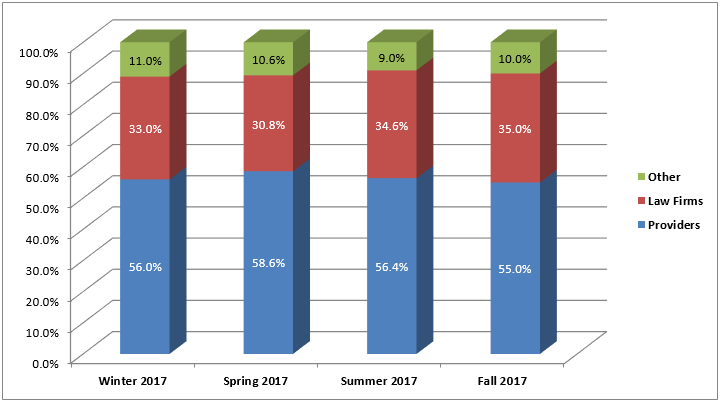
When comparing this year’s Fall survey to last year’s survey, the survey was once again less diverse than it was a year ago, especially with regard to the percentage of “Other” respondents. Next year may be more of a baseline if the 100 respondent limit still applies (it didn’t go into effect until this year):
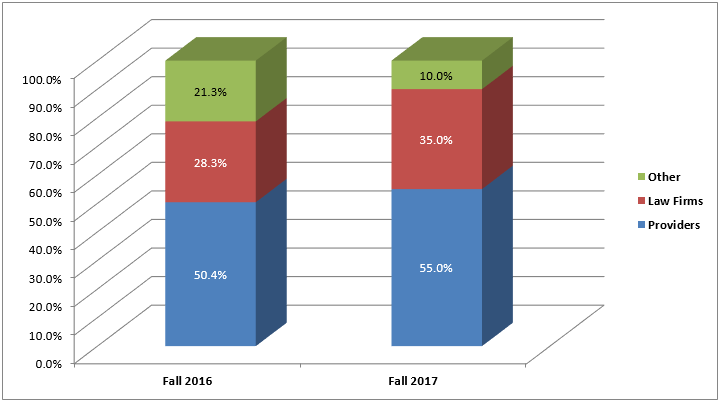
Over Half of Respondents Continue to Consider Business to Be Good: Over half (55%, to be exact) of respondents rated the current general business conditions for eDiscovery in their segment to be good, with 9% rating business conditions as bad. Last quarter, those numbers were 53.4% and 5% respectively, so this quarter reflects a bit of an uptick in the “bad” business respondents. Will that continue? We’ll see. Here is the trend for the last four quarterly surveys:
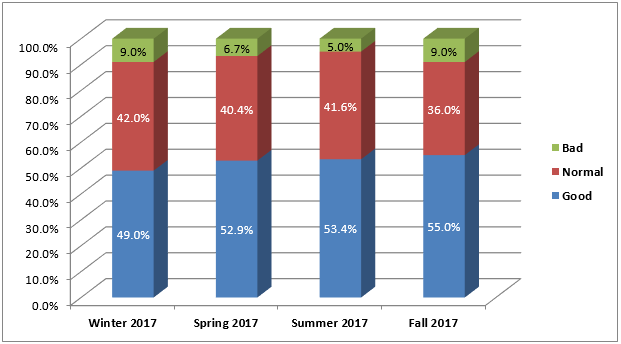
When comparing against last year’s Fall survey, respondents this Fall are slightly more bearish than they were a year ago (slight drop in “business is good” respondents, slight increase in “business is bad” respondents). Not a significant change, but worth keeping an eye on:
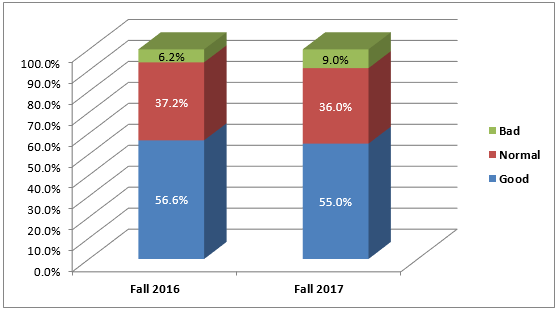
Almost All Expect eDiscovery Business Conditions to be as Good or Better Six Months From Now: Almost all respondents (96%) expect business conditions will be in their segment to be the same or better six months from now (up from last quarter’s 93.1%), and the percentage expecting business to be better rose considerably to 55%. So, we have a bunch of optimists! Revenue (at combined 95% for the same or better) rose very slightly from the last quarter, while profit (combined 89%) essentially stayed the same from last quarter (but those predicting higher profits rose over 5 percent). Here is the profits trend for the last four quarterly surveys:
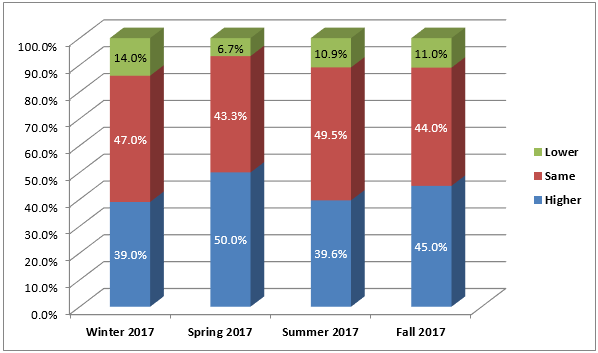
When compared against last year’s Fall survey, the distribution for profits six months from now in this year’s survey is a bit more polarized than last year’s Fall results with a 3.4% increase of respondents expecting higher profits, but also a 0.4% increase of respondents expecting lower profits:
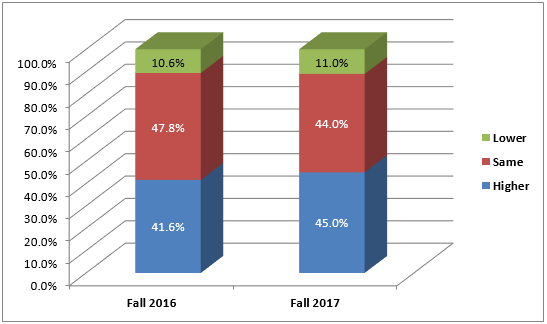
Nearly a Third Chose Budgetary Constraints as Being Most Impactful to eDiscovery Business: It’s budget time! Budgetary Constraints was the top impactful factor to the business of eDiscovery over the next six months at 31% (aabout a 50% increase from last quarter) with Increasing Volumes of Data next up at 24%. The other four factors were comparable: Data Security (13%), Increasing Types of Data (11%, back to its normal position in the pack), Lack of Personnel (also 11%) and Inadequate Technology (at 10%). The graph below illustrates the distribution across the most recent four quarterly surveys.
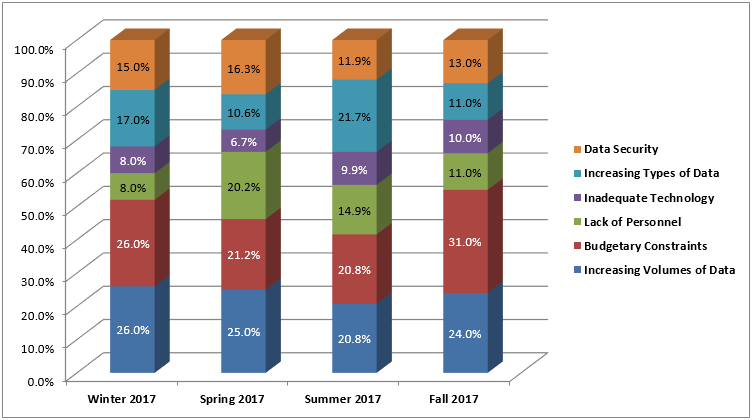
A year ago, it was flip-flopped with Increasing Volumes of Data on top and Budgetary Constraints a strong second as the most impactful to eDiscovery business. Those two factors are usually cited as the top two factors expected to impact eDiscovery business the most:
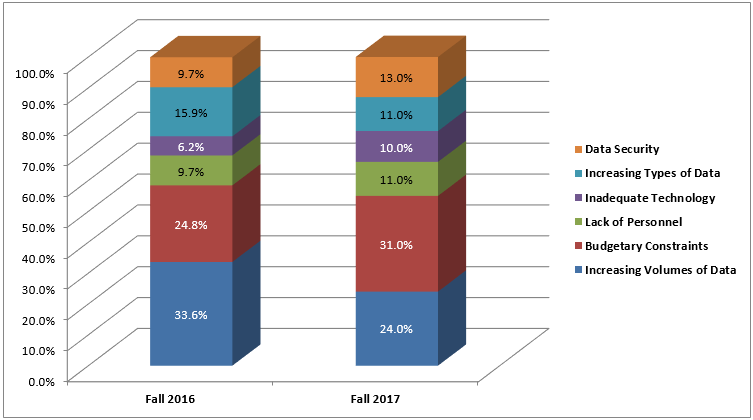
Executive Leader and Management Respondents Are the Strong Majority: Executive Leadership respondents rose strongly to 48% of respondents (from 41.6% last quarter), while Operational Management respondents also rose (again) to 36% – a total of 84% respondents from leadership and management roles. Tactical Execution respondents dropped to its lowest percentage yet – 16%. So, this is a survey primarily of leaders and managers, not so much doers. Here’s the breakdown of the last four quarters:
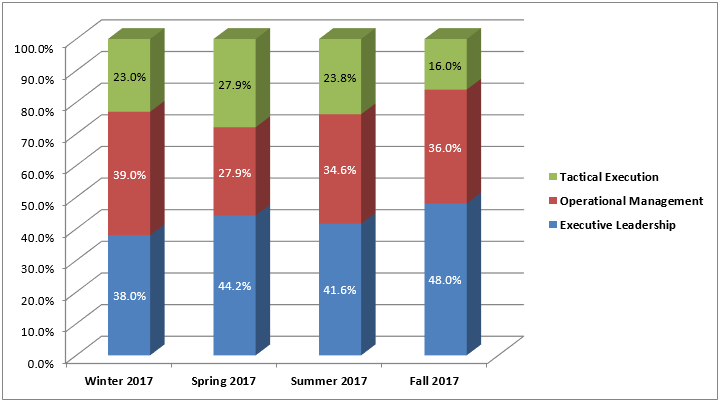
The survey is considerably less distributed than last year as well.
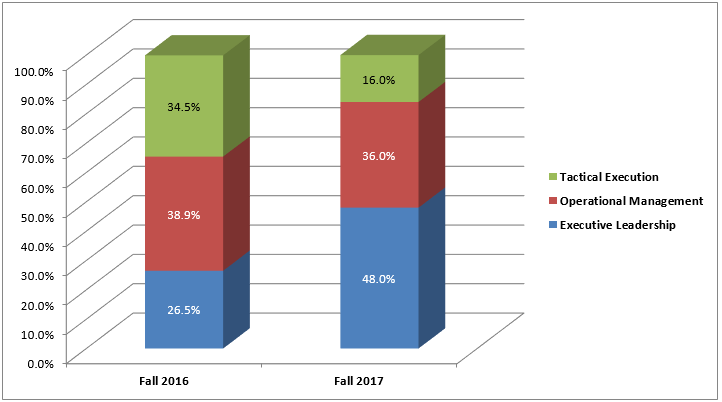
Again, Rob has published the results on his site here, which shows responses to additional questions not referenced here. Check them out. Winter, Spring Summer or Fall, all you gotta do is call! (or vote)…
So, what do you think? What’s your state of confidence in the business of eDiscovery? Please share any comments you might have or if you’d like to know more about a particular topic.

Disclaimer: The views represented herein are exclusively the views of the author, and do not necessarily represent the views held by CloudNine. eDiscovery Daily is made available by CloudNine solely for educational purposes to provide general information about general eDiscovery principles and not to provide specific legal advice applicable to any particular circumstance. eDiscovery Daily should not be used as a substitute for competent legal advice from a lawyer you have retained and who has agreed to represent you.

















